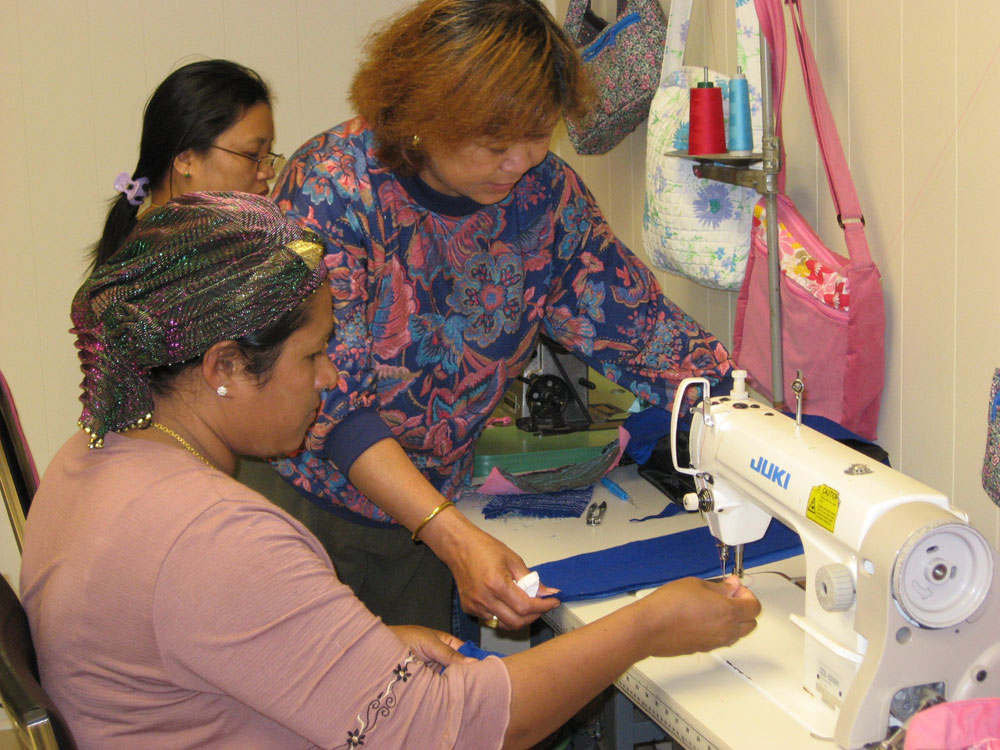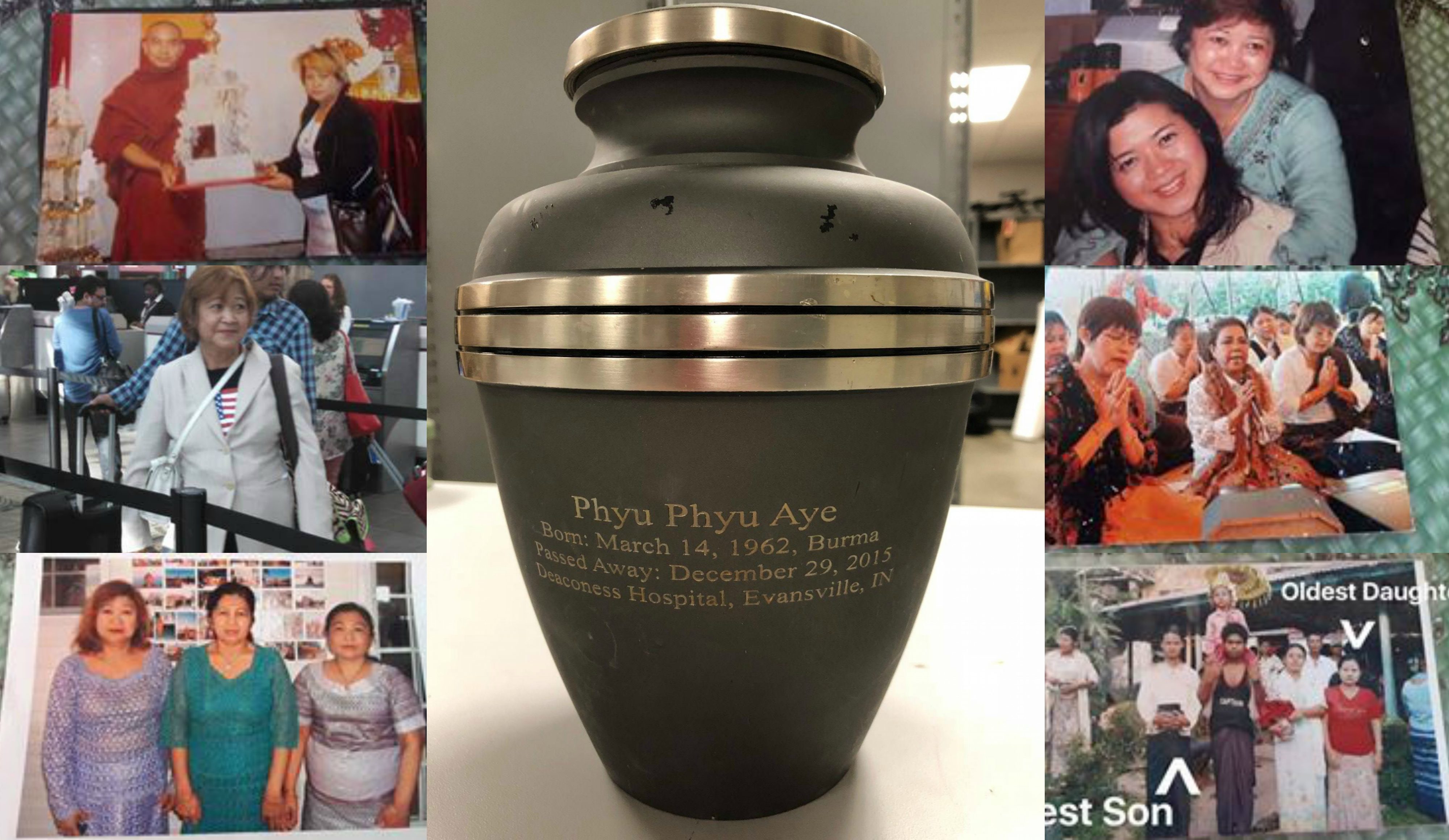It took one person to strip Phyu Phyu Aye of her dignity and an unexpected, international network of total strangers to restore it.
A month ago, on the morning of March 29, Lory Adams, the property room manager for the police department of the small riverside town of Clarksville, Indiana, logged into the department’s Facebook page and made a plea to her local community. The mystery that she had been trying to solve for the last year and a half seemed impossible to crack, and this post was a final Hail Mary before it was time to give up.
As she watched the post and waited for a new lead, she thought about the dull, gray urn in the police department’s store room, tucked among confiscated weapons and money rank with weed.
The surface of the urn, which was now sacred to her, was engraved with the words:
Phyu Phyu Aye
Born: March 14, 1962, Burma
Passed Away: December 29, 2015
Deaconess Hospital, Evansville, IN
Abandoned by her people
The urn was found on a rock on the bank of the Ohio River in Oct. 2016. No one knows if it washed up, was previously fished out, or was placed there. Either way, it ended up at the Clarksville Police Department, where Lory had immediately set out to find the woman’s family and return the cremains to them, wherever they might be.
“I came in hot on this case,” Lory recalled. “The inscription on the urn made it easy to find the obituary, which I found on day one.”
The obituary said that Phyu Phyu Aye had lived in Robards, Kentucky, just across the river and 150 miles west of Clarksville. It said she worked at the Tyson chicken processing plant and that she was survived by a husband, “W”, also Burmese, and three children still in Myanmar. It also listed the home that managed her funeral.
(Some names in this story are being withheld at the request of the people involved.)
Once the funeral home verified the urn, Lory called Tyson’s human resources department. Phyu Phyu Aye’s husband was also employed there but was doing weekend commitments in jail for an unrelated case. Lory left a message for “W” at the jail but never received a call back.
Lory next looked into “W”’s record and discovered that it listed a Burmese woman, “M”, as his next of kin. Lory dialed the number on file. Claiming not to speak any English, “M” promised to have her daughter call back shortly. Lory sensed fear in the woman’s voice.
While she waited for a call from “M”’s daughter, Lory received a message from Ven Kuthala, a Buddhist monk who presided over Phyu Phyu Aye’s funeral. He had some startling news. Phyu Phyu Aye had been legally divorced by the time she died. “W” was her most recent boyfriend and not the father of her children. The local Burmese community had raised the money for the funeral back in 2015, and “W” assured the community that he would send his girlfriend’s ashes to her children in Myanmar.
“Later,” Ven Kuthala told Lory, “I noticed that ‘W’ got a new girlfriend.”
It turned out the girlfriend was “M”, and Ven Kuthala knew her personally. In fact, just a few weeks before the urn was found, Ven Kuthala had seen “M” announce on Facebook that she planned to throw Phyu Phyu Aye’s ashes into the river, but she unfriended the monk when she learned Lory had contacted him.
“I am really sorry for Phyu Phyu Aye and her dignity when I seen (sic) her post,” Ven Kuthala wrote to Lory. “I will help you to return Phyu Phyu Aye’s remains to her children.”
Lory waited more than a year for that help, but the monk never followed through. Her only contact inside Phyu Phyu Aye’s community was gone. On top of that, she couldn’t enlist the power of the Clarksville Police Department to force “W” or “M” or the monk to take action because this wasn’t a criminal case. For Lory, bringing Phyu Phyu Aye home was a matter of the heart.
“She did not belong in the property room,” Lory said.
A year and a half after Phyu Phyu Aye’s cremains were found on the bank of the Ohio River, the trail had gone cold. Lory contacted the nearest Myanmar consulate, but she received no reply. Absent any other options, the police chief finally gave her the green light to post about Phyu Phyu Aye from the police department’s Facebook page.
The post would be a game-changer. It’s also how I entered the story.
Help from across the world
A few hours after Lory posted about Phyu Phyu Aye’s abandoned remains, a former coworker of mine from a bank in Clarksville tagged me in a comment under the post. The former coworker knew I had moved to Myanmar two years ago with my Burmese husband and thought I might be able to help Lory from here.
The next day, more information came in. Another Clarksville resident posted a video from Jan. 2016 in the comments showing Phyu Phyu Aye’s wake. Lory was finally able to put a face to the name.
My husband, Yè, and I told Lory we could help her by contacting any non-English-speaking Burmese leads they had. Lory was in the process of inspecting the Facebook pages of people who had reacted to the original wake video in 2016; these people would have known Phyu Phyu Aye. Lory put us to work immediately, having us comb through and translate information she had gathered.
Among the material she sent us was a 2010 NPR article article about Burmese refugees in Indiana. It mentioned Phyu Phyu Aye and said she had been living in the United States for 10 years. She was pictured with short, auburn hair, smiling down over a student at the Refugee Resource Center in Fort Wayne, Indiana, where she taught sewing.
Discoveries like this were revelatory for Lory, who had developed a strong connection with Phyu Phyu Aye, even though she was long-deceased. She asked Yè how to pronounce Phyu Phyu Aye’s name properly.
“I talk to her every day,” Lory said. “She’s very patient. I told her, ‘I’ll get you home, just please don’t haunt me!’”
After pursuing every lead we could find, even calling “W” himself (with no luck), Yè and I decided to take a page out of Lory’s book. Lory’s small-town Facebook post would never make it as far as Yangon, much less to whatever village Phyu Phyu Aye was from, so on April 1, using our business’s Facebook page, Ye and I shot a targeted post about Phyu Phyu Aye across Myanmar in Burmese and English.
The following day, Yè dug up the Burmese obituary Ven Kuthala had written for Phyu Phyu Aye. He discovered that she didn’t have three children; she had five. Her hometown was on the island of Bilu in Mon State. We immediately re-targeted our post’s reach, wondering why Ven Kuthala hadn’t passed this information to Lory on day one.
By this time, the Burmese community across the United States was buzzing in response to Lory’s original post. People who had read about Phyu Phyu Aye on social media were confounded as to how to contact her children, since the only people who knew Phyu Phyu Aye refused to cooperate.
Yè reached out to Nyi Latt from North Carolina. He was one of the seven people who had reacted to the original video of Phyu Phyu Aye’s funeral. He knew her well.
“When she was alive, everyone ate from her table,” Nyi Latt said. “Now that she has gone, they neglected to even put her in the ground.”
He didn’t know how to contact Phyu Phyu Aye’s children, but he still wanted to help the woman who had supported him and many other refugees over the years.

In Myanmar, our targeted ad received a mixed response.
“It’s karma; leave it alone.”
“Fake post.”
Lots of crying emojis.
The day after we posted our ad targeting Bilu Island, a Facebook user named Soe Htet Aung commented: “I’m from her village. How can I contact you?”
With cautious excitement, Yè called. Soe Htet Aung answered. He said he is the neighbor of Phyu Phyu Aye’s daughter’s and would arrange a phone call with the family shortly.
“I’m going to cry. This is wonderful,” Lory wrote to me when she heard the news.
Children kept in the dark
Two of Phyu Phyu Aye’s five children still lived in their mother’s hometown. They borrowed their neighbor’s phone to accept our call. They said they had seen their mother during her last visit to Myanmar in 2015. While there, she had eaten some bad food. She grew violently ill during the trip. A few weeks after she flew back to the United States, “W” called Phyu Phyu Aye’s children to tell them their mother had passed away. He told them he buried her and that he would send her jewelry and other possessions to them. That was the last they ever heard from him.
After the call with Yé, anxious to prove that they were Phyu Phyu Aye’s real family, they flooded Yé’s inbox with photos.

Lory finalized the paperwork necessary to send Phyu Phyu Aye’s cremains to Myanmar and tenderly placed them in a box. In a nod to Burmese custom, she instructed Phyu Phyu Aye’s spirit to travel with the box back home to Myanmar.
“She’s probably relieved I’m saying her name right,” Lory mused. “I think I will miss her.”
Almost at peace
Phyu Phyu Aye is expected to arrive in Myanmar in a few weeks. A local sponsor volunteered to transport her children to Yangon for the handover.
The news of her journey home spread in her hometown and, due to a local tradition, the village has forbidden the cremains to be buried there. Local tradition requires a body to be buried within seven days of passing. If not, the community fears the deceased will haunt them.
“She won’t!” Lory protested. “She’s great!”
Phyu Phyu Aye’s children remain optimistic and have arranged to quietly provide for their mother elsewhere.
This, however, is not the final chapter in Phyu Phyu Aye’s story. Members of the Burmese-American community now say that “W” and his new flame “M” shacked up in the home that was promised to Phyu Phyu Aye’s children, who are now looking for a champion back in the states to win back their mother’s things. If they don’t win back the property before “W” has been paying taxes on it for seven years, it may all end up legally his.
One member of the community is working with a judge to win back Phyu Phyu Aye’s property from “W” on behalf of her children. (This person has requested anonymity.)
Also on the case, of course, is Lory, who intends to continue helping Phyu Phyu Aye however she can.



Reader Interactions